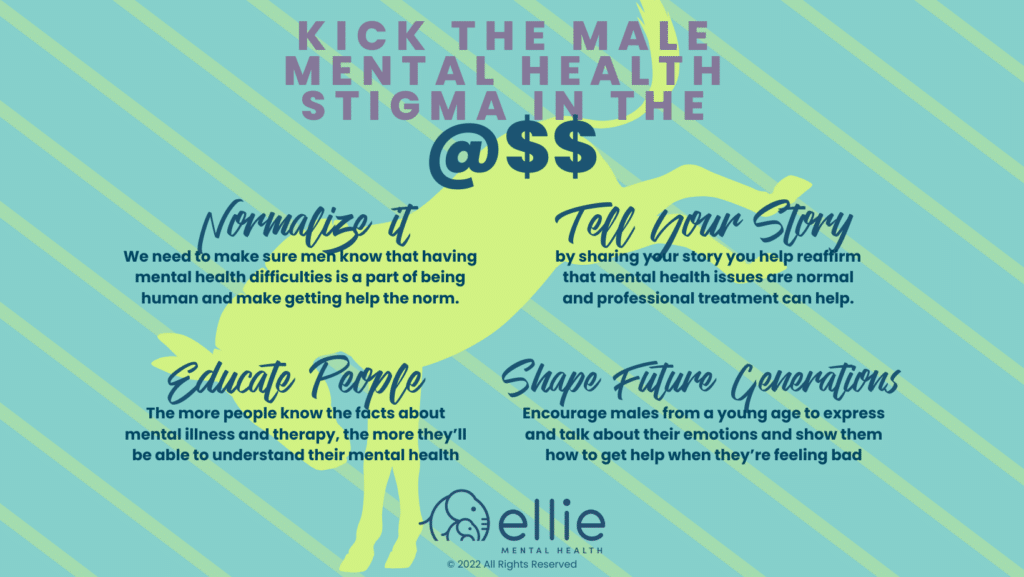There are many barriers that stand in the way of people getting mental health care, and as a society, stigma is one of the most problematic and destructive hurdles we have to cross. When we struggle with our mental health, there should be no shame in seeking out help and getting therapy. But many of us get wrapped up in thinking that we simply need to “toughen up” or continue living with the pain, frustration, anger, or self-hate we feel inside.
While men and women both experience their share of mental health issues, men often struggle to seek help. The male mental health stigma is closely tied to how our society perceives masculinity. American society is one that links “manliness” with being strong, self-sufficient, capable, and reserved. Through this lens, acknowledging mental health issues for men is like admitting they aren’t an unbreakable fortress that’s unaffected by the difficulties of life. And going to therapy concedes that they can’t do it themselves, requiring men to unpack, disclose, and process all the difficult emotions society tell them they need to repress and keep inside.
Unfortunately, the result of untreated mental health issues is often severe. Broken relationships, job loss, substance abuse, and suicide are all serious but common outcomes of trying to do it ourselves. And while men report mental illnesses, like depression or anxiety, at lower rates than women, they die by suicide 3.88 times more often than women and are more likely to develop a substance abuse disorder or die from overdose.
Considering therapy? We got you. Contact Ellie Mental Health and get paired with a therapist near you.
Understanding Men’s Mental Health Issues
Every man is unique in how he experiences and expresses mental health issues, but there are many common trends in men’s mental health. According to one study published by the American Psychological Association, while both man and women experience high rates of anxiety or depression, they are often presented very differently.
For instance, the study found that while women with anxiety disorders often internalize their emotions or ruminate on problems more, men are more like to act out and externalize how they’re feeling. When faced with a difficult life situation, woman tend to become socially withdrawn and depressed, whereas men are more likely to cope with negative emotions through aggressive, impulsive, or rebellious behavior.
While men’s mental health issues may often go undiagnosed, some of the most common mental health issues in men include:
- Depression: Men with depression tend to show symptoms like aggressiveness and irritability, disinterest in work or hobbies, sleep issues, and physical symptoms.
- Substance Abuse: While new findings are revealing women are also very susceptible to substance abuse disorders and experience them at high rates, around 16% of men have an alcohol use disorder and more likely than women to use almost all types of illicit drugs. 23% of males older than age 12 reported illegal drug use in 2020.
- Post-Traumatic Stress Disorder: Men can experience trauma in many ways, including work-induced trauma that’s common with occupations like law enforcement, emergency response, or military combat.
- Anxiety Disorders: Men with anxiety disorders may appear irritable, worried, and tense. Many men may recognize or seek treatment for physical issues caused by anxiety, such as high blood pressure, muscle pain, insomnia, fatigue, headaches, or digestive discomfort.
- Schizophrenia: Males often have an earlier onset of schizophrenia than their female counterparts, and men are thought to be two or three times more likely to develop it.
How the Mental Health Stigma Affects Men
The male mental health stigma affects the way men perceive mental health concerns and therapy. Here are a few examples of how this stigma might play out.
Men may struggle to express their emotions.
From a young age, boys may be unsupported or discouraged in expressing strong emotion – especially if they’re feeling depressed, anxious, or overwhelmed. Even as adults, men may be ridiculed or looked down upon for showing fear or deep sadness. As a result, men may try to push these negative emotions away and avoid discussing them with others.
If you have opened up to someone and they downplayed your struggles, you may be a victim of gaslighting. Check out our other blog for common gaslighting phrases.
Men may not realize that they have a mental health condition.
Men may fail to recognize negative emotions as symptoms of mental health condition or may be more likely to downplay how they’re feeling. And since men may associate feelings of sadness or loneliness with poor mental health, they may not recognize pent up anger, irritability, boredom, impulsiveness, insomnia, or fatigue as symptoms.
Men may turn to substances or other unhealthy coping mechanisms over seeking treatment.
When experiencing unwanted, negative emotions, men often attempt to cope by compartmentalizing or escaping from their emotions. They may turn to dopamine-triggering activities that help distract them from how they’re feeling, such as competitive hobbies, risky activities, alcohol and drugs, or sexual activity. Some of these distractions can be unhealthy and lead to addictive behaviors or cause men to neglect other, more stressful areas of their life (like “fixing” a rocky relationship or parenting a child with behavioral issues).
Men may believe that they can push through negative emotions or work through problematic behaviors on their own.
In general, men often avoid seeking help – whether they’re working on a project or struggling with their mental health. Men often get a great a deal of satisfaction and pride from working through a problem and finding the solution on their own. If a man struggles with a negative behavior or addiction, they may think they can overcome it if they muster the willpower to change. And asking for help means admitting they’re not “strong enough” to do it on their own.
Men may have a negative opinion about the effectiveness of therapy.
Men may have the preconception that therapy doesn’t work or that is simply won’t help them. They may think that “talking it out” isn’t the solution they need. When struggling with their mental health, men fight feel like they’ve already lost the battle. If they can’t seem to control their own emotions or behaviors, it can take a toll on their self-confidence and self-perception. Shame, self-hatred, and poor self-esteem can lead men to think that they’re a lost cause and that going to therapy would be pointless.
Men might not consider seeking treatment until their mental health or behavioral issues are severe.
Men might not seek help from a therapist until they’ve hit rock bottom. Mental health issues can drive a wedge in their relationships, including their relationship with a spouse or significant other. They might not consider therapy until their spouse gives an ultimatum or they fear they might hurt themselves or others.
Men might have difficulties being vulnerable in therapy and connecting with their therapist.
Once men are in therapy, they might struggle more than their female counterparts to trust and connect with their therapist. Also, the act of being vulnerable and being asked to share things they may have never talked about out loud before can be very unsettling and even painful. If the experience was unhelpful or incredibly difficult, men may be unlikely to continue with therapy or try it again in the future.
How to Kick The Male Mental Health Stigma in the @$$
When we talk about something as big and complicated as gender norms, it can seem like the mental health stigma is just too big of a hurdle to attack. How can we get a whole society of people to change the way they think about masculinity and encourage men to think about their emotions and mental health differently?
Here are just a few ways open the conversation about male mental health and destigmatize getting therapy:
- Normalize It: Everyone has rough patches. Everyone has bad mental health days. And many, many people struggle with serious mental health issues. We need to make sure men know that having mental health difficulties is a part of being human and make getting help the norm.
- Tell Your Story: If you’re a man who has struggled with your mental health, is going to therapy, or has experienced the benefits of going to therapy, share your story. It might be scary or uncomfortable at first to bring your struggles to light, but by sharing your story you help reaffirm that mental health issues are normal and professional treatment can help.
- Educate People: The more people know the facts about mental illness and therapy, the more they’ll be able to understand their mental health, identify symptoms, and know the benefits of getting help. This includes educating men on the unique ways in which males might manifest a mental health condition and how to recognize the signs in themselves and others.
- Shape Future Generations: Whether you’re a parent, family member, teacher, or mentor, be aware of how you interact with the boys, teens, and young men in your life. Encourage males from a young age to express and talk about their emotions – even crying – and show them how to get help when they’re feeling bad. If your child is having a hard time coping with emotions or showing signs of a mental illness, take them to a therapist from a young age and help them become comfortable with getting this type of care.
It’s okay to not feel okay. Ellie Mental Health is here to guide you in this journey. Get matched with a therapist today



